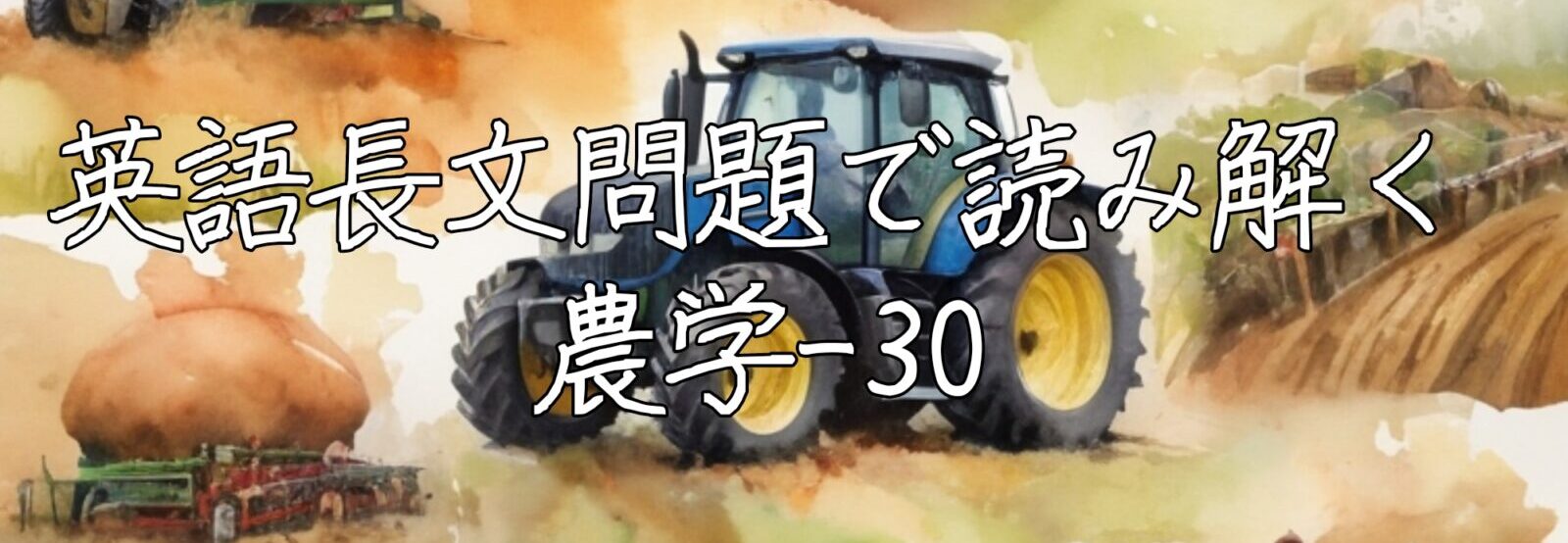英語の読解力を向上させるには、なんと言っても多読が一番。とはいえ、多読をするための教材として小説を読む気力が無かったり、効率が悪いと感じてしまったり…
そんな悩みを解決するために作成したのがこの長文問題集シリーズになります。
各学問に特化させた長文を読み進めることで、多読をしながら知識も身につけることができます。
そんな「多読×知識」を実現させた長文問題集になります。
今回は英検2級レベルの英語長文問題を読み解きながら、農学の基本的な知識を身につけることが出来る問題集をkindleにて出版しました!

英語長文問題で読み解く農学-30: 農学の重要テーマを英語で読み解く 英語長文問題で読み解く学問シリーズ
これまでに発売した英語の長文問題集の一覧はコチラから!
英語長文で読み解く農学-30 の中身を公開!
以下、どんな内容になっているのかを公開します!
目次
はじめに
1.農学 – 農業に関連する科学的な研究分野。
2.作物学 – 作物の栽培や改良に関する研究。
3.農業経済学 – 農業の経済活動や政策について研究する分野。
4.土壌学 – 土壌の性質や管理方法を研究する学問。
5.植物病理学 – 植物の病気とその管理方法を研究する分野。
6.農業生態学 – 農業システムと生態系の相互作用を研究する分野。
7.有機農業 – 化学肥料や農薬を使用せず、自然な方法で農作物を栽培する農業。
8.持続可能な農業 – 環境保護と資源管理を考慮した農業方法。
9.無機肥料 – 化学的に合成された肥料で、主に窒素、リン酸、カリウムを含む。
10.有機肥料 – 動植物由来の天然肥料で、土壌の健康を保つ役割を果たす。
11.農薬 – 害虫、雑草、病気から作物を保護するための化学薬品。
12.除草剤 – 雑草を駆除するために使用される化学物質。
13.害虫防除 – 作物を害虫から守るための方法や技術。
14.輪作 – 同じ場所に異なる作物を順次栽培することによって土壌を管理する方法。
15.農業機械化 – 農業における機械の導入と活用。
16.水稲栽培 – 水田での稲作栽培方法。
17.乾燥農業 – 降水量が少ない地域での作物栽培技術。
18.温室栽培 – 温度や湿度を管理した環境での作物栽培方法。
19.食料品廃棄 – 消費されずに廃棄される食品。
20.酪農 – 牛乳や乳製品の生産を目的とした畜産業。
21.バイオテクノロジー – 生物学的手法を用いて農業や食品生産を改善する技術。
22.ゲノム編集 – 特定の遺伝子を改変する技術で、作物や家畜の改良に使用される。
23.食料安全保障 – 安定した食料供給を確保するための政策や技術。
24.食糧自給率 – 国内で消費される食料を国内で生産する割合。
25.農業政策 – 政府が農業生産を支援し、規制するための政策。
26.食糧安全性 – 消費者が安全に食べられる食品を提供するための基準や規制。
27.遺伝子組み換え作物 – 遺伝子操作によって特定の特性を持たせた作物。
28.都市農業 – 都市部で行われる農業活動。
29.小規模農業 – 小規模で行われる家庭農業や個人農業。
30.食の持続可能性 – 長期的に安定した食料供給を実現するための取り組み。
1.農学 – 農業に関連する科学的な研究分野。
Understanding Agricultural Science
Agricultural Science is the study of the principles and practices that are involved in the cultivation of plants and the rearing of animals for food, fiber, and other products. This field of science is crucial for understanding how to improve the quality and quantity of agricultural products, which is essential for feeding a growing global population.
One important aspect of Agricultural Science is the study of crops. Crops are plants that are grown primarily for human consumption, and they include grains like wheat and rice, vegetables like tomatoes and carrots, and fruits like apples and bananas. Understanding how these crops grow, and what they need to thrive, is fundamental to agricultural science. For instance, crops require certain nutrients from the soil, such as nitrogen, phosphorus, and potassium, to grow effectively. Without these nutrients, the plants may not grow well, which can lead to reduced yields.
In addition to nutrients, crops also need the right amount of water and sunlight. For example, rice, which is a staple food in many countries, needs a lot of water to grow properly. On the other hand, wheat, which is another important crop, can grow in drier conditions. Agricultural scientists study the best ways to manage these resources to ensure that crops can grow under various environmental conditions.
Another critical area of Agricultural Science is the study of soil. Soil is more than just dirt; it is a complex mixture of minerals, organic matter, air, and water. It provides the nutrients that plants need to grow, and it also supports the roots of the plants. Different types of soil have different properties, and some soils are better suited for growing certain crops than others. For example, sandy soils drain water quickly and are good for crops like carrots and potatoes, while clay soils retain water and are better for crops like rice.
Animal husbandry is another significant part of Agricultural Science. This involves the care, breeding, and management of farm animals like cows, chickens, and pigs. These animals are raised for various products, including meat, milk, eggs, and wool. Just like crops, animals need proper care to thrive. They require a balanced diet, which includes proteins, carbohydrates, vitamins, and minerals. For example, cows need to eat a diet rich in grass and hay to produce high-quality milk. Additionally, agricultural scientists study how to prevent and treat diseases in farm animals to ensure that they remain healthy and productive.
Agricultural Science also includes the study of sustainable farming practices. Sustainable farming is about producing food in a way that is good for the environment and that can be continued for generations. This might include practices like crop rotation, where different crops are planted in the same field over time to keep the soil healthy. It can also involve reducing the use of chemical pesticides and fertilizers, which can harm the environment. For example, organic farming avoids synthetic chemicals and relies on natural methods to grow crops and raise animals.
Moreover, technology plays a vital role in modern agriculture. Advances in technology have led to the development of new farming techniques that increase efficiency and reduce waste. For instance, precision agriculture uses GPS technology to monitor crop fields and apply water, fertilizers, and pesticides only where they are needed, which helps to conserve resources and reduce costs. Biotechnology, which involves manipulating the DNA of plants and animals, has also contributed to the development of crops that are more resistant to pests and diseases and that can grow in harsher environments.
In summary, Agricultural Science is a broad field that encompasses the study of crops, soil, animals, and sustainable farming practices. It plays a crucial role in ensuring that we can produce enough food to feed the world’s population while also protecting the environment.
注釈
- Agricultural Science – 農学
- Crop – 作物
- Nutrients – 栄養素
- Yields – 収量
- Soil – 土壌
- Organic matter – 有機物
- Animal husbandry – 畜産学
- Balanced diet – バランスの取れた食事
- Sustainable farming – 持続可能な農業
- Crop rotation – 輪作
- Chemical pesticides – 化学農薬
- Precision agriculture – 精密農業
- Biotechnology – バイオテクノロジー
設問
Question 1:
What is one of the main goals of Agricultural Science?
A) To produce synthetic materials
B) To study the principles of plant and animal growth
C) To develop urban infrastructure
D) To reduce the global population
Question 2:
Which nutrient is essential for crop growth?
A) Iron
B) Nitrogen
C) Carbon dioxide
D) Sulfur
Question 3:
What is the purpose of crop rotation in sustainable farming?
A) To increase soil acidity
B) To prevent soil erosion
C) To maintain soil health and fertility
D) To grow the same crop repeatedly
Question 4:
Which type of soil is suitable for crops like carrots and potatoes?
A) Clay soil
B) Sandy soil
C) Loamy soil
D) Saline soil
Question 5:
What is one benefit of precision agriculture?
A) It eliminates the need for fertilizers
B) It allows for efficient resource use
C) It increases the number of farm animals
D) It reduces the amount of sunlight needed for crops
Question 6:
Why is organic farming considered sustainable?
A) It uses synthetic chemicals
B) It increases crop yields quickly
C) It relies on natural farming methods
D) It requires less water than traditional farming
Question 7:
What do cows need to produce high-quality milk?
A) A diet rich in carbohydrates
B) A diet rich in grass and hay
C) A diet rich in fats
D) A diet rich in water only
Question 8:
How has biotechnology contributed to agriculture?
A) By reducing the need for sunlight
B) By creating crops that can grow in harsh environments
C) By eliminating the use of water in farming
D) By increasing the use of chemical fertilizers
Question 9:
What is a key component of soil that supports plant growth?
A) Air
B) Sand
C) Plastic
D) Metal
Question 10:
Why is Agricultural Science important for the future?
A) It helps reduce the need for food
B) It focuses only on technology
C) It ensures food production while protecting the environment
D) It promotes the use of chemical pesticides
解答・解説
Question 1: 農学の主な目標の一つは何ですか?
A) 合成材料を生産すること
B) 植物と動物の成長の原理を研究すること
C) 都市インフラを整備すること
D) 世界人口を減らすこと
Answer: B) 植物と動物の成長の原理を研究すること
Explanation: 農学は、植物や動物の成長の原理と実践を研究することに焦点を当てています。
Question 2: 作物の成長に必要な栄養素はどれですか?
A) 鉄
B) 窒素
C) 二酸化炭素
D) 硫黄
Answer: B) 窒素
Explanation: 作物の成長には、窒素、リン、カリウムなどの栄養素が必要です。
Question 3: 持続可能な農業で輪作を行う目的は何ですか?
A) 土壌の酸性度を高めること
B) 土壌の侵食を防ぐこと
C) 土壌の健康と肥沃度を維持すること
D) 同じ作物を繰り返し栽培すること
Answer: C) 土壌の健康と肥沃度を維持すること
Explanation: 輪作は、土壌の健康と肥沃度を維持し、土壌が疲弊するのを防ぐために行われます。
Question 4: ニンジンやジャガイモに適した土壌はどれですか?
A) 粘土質の土壌
B) 砂質の土壌
C) ローム質の土壌
D) 塩分の多い土壌
Answer: B) 砂質の土壌
Explanation: 砂質の土壌は水はけが良く、ニンジンやジャガイモなどの作物に適しています。
Question 5: 精密農業の利点は何ですか?
A) 肥料の必要性をなくす
B) 資源の効率的な利用を可能にする
C) 家畜の数を増やす
D) 作物に必要な日光の量を減らす
Answer: B) 資源の効率的な利用を可能にする
Explanation: 精密農業は、必要な場所にのみ水や肥料を供給することで、資源を効率的に利用できるようにします。
と、このような感じで、30問の長文問題が一冊にまとまっております!
農学の重要テーマ、30問あります!
目次にもあるように、30個の農学にまつわる重要テーマやキーワードを使い長文問題を作りました。
英語力を向上させたい、かつ、農学の知識を得たい人にとって、最適な長文問題集となっております。
英語レベルは英検2級を目指している人にとって丁度いい塩梅。
タイパを重視して、農学の知識を得つつ、英語の読解力を向上させたい人、「多読×知識」を実践し、英語力も知識も向上させたい方々は、ぜひ活用してみてください。

英語長文問題で読み解く農学-30: 農学の重要テーマを英語で読み解く 英語長文問題で読み解く学問シリーズ
これまでに発売した英語の長文問題集の一覧はコチラから!
#英語 #英語学習 #英語勉強 #英語長文問題 #多読 #第二言語習得 #英検対策 #リーディング対策 #農学 #農業





-320x180.jpg)






コメント